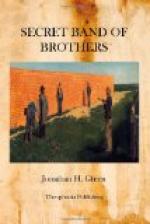I inferred, from the last remark, that he had reference to the judiciary. I had noticed that during his two days’ conversation, no person had visited the room but the physician and a certain judge who lived near Florence, Alabama, and the latter remained only a few minutes. I found out his name by seeing it written upon his hat lining, which had been placed upon the window opening on the piazza. After the judge had retired, the colonel resumed the conversation.
“I am accused by my friends with treachery to the brotherhood. They think that I, in concert with my brother, have laid a plan to clear ourselves by their downfall. When the news was out that the papers were lost, I saw the most marked indications of hostility. They came forward and pledged to bail me in any amount, provided I would return their letters, but swore that I should never go from this room alive, if I did not produce them. I am certain to suffer death. My sentence is fixed, and I have no hope. My brother and his advisers have ruined me. They have had me borne hither that I might not understand their plans. I am satisfied the papers are in the hands of the intimate friends of my brother and those who had manifested such an interest in my removal to this place. I have been reduced by medicine, and my inability to exercise—so contrary to my general habits—has seated a fatal disease upon my lungs.”
His disease had been occasioned by the constant use of medicine, which exposed his system to cold, and this, by constant repetition, had entirely destroyed his constitution. I have no doubt that a slow poison was mingled in his medicine. When he had finished this tale of sorrow, he gave me some affectionate advice in something like the following words:




